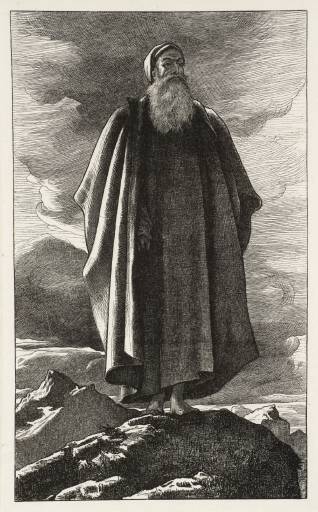

The person who
says it cannot be done
should not interrupt the person doing
it.
~ Chinese Proverb


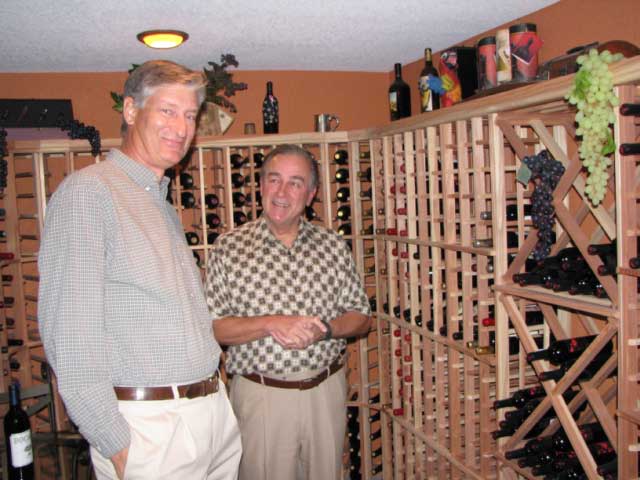


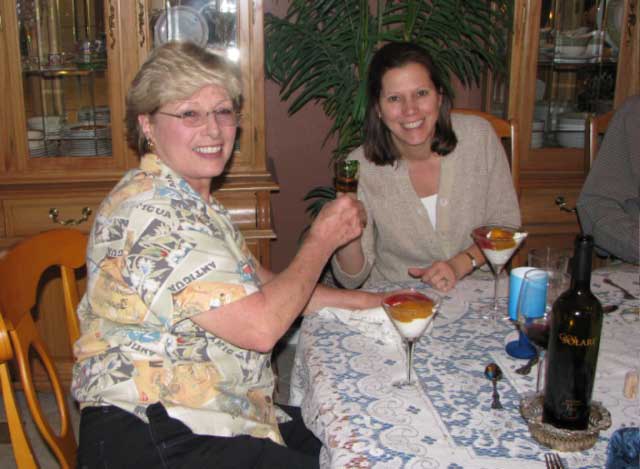
34When the Pharisees heard that he had silenced the Sadducees, they gathered together, 35and one of them, a lawyer, asked him a question to test him. 36"Teacher, which commandment in the law is the greatest?" 37He said to him, "'You shall love the Lord your God with all your heart, and with all your soul, and with all your mind.' 38This is the greatest and first commandment. 39and a second is like it: 'You shall love your neighbor as yourself.' 40On these two commandments hang all the law and the prophets."
41Now while the Pharisees were gathered
together, Jesus asked them this question: 42"What do
you think of the Messiah? Whose son is he?" They said to him, "The son of
David." 43He said to them, "How is it then that David
by the Spirit calls him Lord, saying, 44'The Lord said
to my Lord, "Sit at my right hand, until I put your enemies under your feet"'? 45If David thus calls him Lord, how can he be his
son?" 46No one was able to give him an answer, nor
from that day did anyone dare to ask him any more questions.
Matthew
22:34-46
Agnus Day, by James
Wetzstein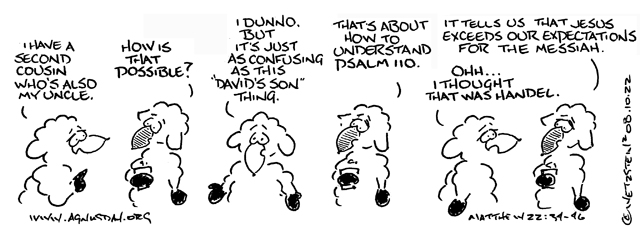
Agnus Day appears with the
permission of www.agnusday.org
Reformation
Day
Agnus Day, by James Wetzstein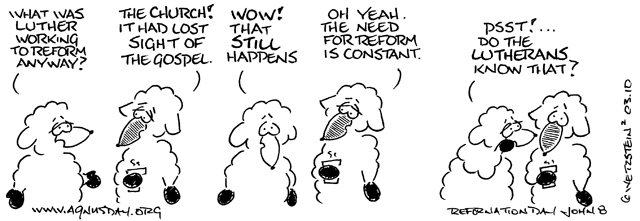
Agnus Day
appears with the permission of www.agnusday.org
Status or service? - 1 Thessalonians 2:1-8 - Living by the Word - Column
Christian Century, Oct 16, 1996 by Edgar Krentz
Status was important in the Roman world of the first century. One knew ones value by one's place in the social pecking order. The Roman social pyramid had the emperor at its apex. Everyone else (senators, equestrians and the mass of the citizens) knew where they stood in relation to those above and below them. Slaves stood at the very bottom.
Like Rome, every provincial city had its own status pyramid. People strove to maintain their position in many ways. Public honor was gained by making outstanding gifts to ones city: a building, or an endowment to pay for education, to keep the local bath or gymnasium in operation, to support some public need. Patronage was built into the system. "Clients" (dependents) gave respect and status to their patron and expected from them favors, advocacy in obtaining positions, and general support. When Jesus urged the Pharisees to give Caesar his due, that message fit well into the social structure.
Entertainment options in the Roman world were very sparse in contrast to our world. It was an oral world, where people delighted in good speech. Orators such as Dio Chrysostom and Aelius Aristides traveled the world giving speeches to great public acclaim, while lesser rhetoricians @public orators and teachers of speaking) achieved status by demonstrating skill in giving impromptu speeches on topics given to them. Philosophers and other wandering teachers did the same. Traveling from place to place, they lived off the fees people paid to hear them speak or to be taught rhetoric or philosophy.
Paul fits into this status pyramid only partially. His earliest letter, I Thessalonians, offers insight into an aspect of his lifestyle that was surprising in that status-oriented society. He arrived in Thessalonica as if he were a traveling rhetorician, but with quite a difference. He had been manhandled in Philippi, yet found the courage to speak boldly.
Paul describes his proclamation in Thessalonica in language that separates him from the traveling rhetoricians. His speech was honest, without words of flattery. He did not look for personal reputation (i.e., status recognition) or financial profit. He worked to support himself. In each of these claims Paul uses the language that Dio Chrysostom used a generation later to satirize false philosophic teachers.
How does one escape the urge for status in a society saturated with praise for the successful, self-made person@ Paul suggests the way one must go. He has a strong sense of call by God. "Just as we have been approved by God to be entrusted with the message of the gospel, even so we speak ..."
Our age has lost its feeling of awe before the majesty of God. Paul had not! He called the Thessalonians to turn away from cult statues to serve a God who is alive and authentic. Read through I Thessalonians and you will be struck by how this consciousness of God pervades what Paul says (e.g., 1:4; 2:13; 4:1, 7, 9, 14; 5:9, 23). Paul lives in the awareness of God's actions in his own life and the life of others.
This commitment to God and the good news about Jesus frees Paul from the need to achieve status for himself. His status is conferred by God, and it opens up for him a lifestyle that correlates with that commitment. He has no need to use his status as an apostle to command recognition. Instead he functions like the professional wet-nurse returning home to cherish and caress her own infant. Paul shares not only the gospel but his own life - to the degree that he compares himself to a person without status.
One achieves status by conforming to the norms of one's society. About 90 years after Paul's death the unknown author of the Epistle to Diognetus 5-6 described how Christians live in contemporary society: "Christians are not separated from others in country, language or customs.... Although they inhabit Greek and barbarian cities ... and follow local customs in dress, diet and life style, they demonstrate the marvelous, unusual basis of their very own commonwealth." They live as aliens in their own land, participate as citizens, endure as foreigners; they obey the laws but conquer them in their own lives. The author rings the changes on how they differ from the society while conforming to many of its norms. In speaking like that he is eminently Pauline.
The Gospel lesson (Matt. 22:34-46) reinforces what Paul says about himself. What is the greatest commandment in the Torah? This question and Jesus' answer show how rooted jesus is in judaism, whose priorities and insights he affirms. He shares with judaism the summary of the law that is cited. No antinomian he!
But Jesus interprets the law in terms of Leviticus 19:18. Commitment to God and the Torah implies loving service to ones neighbor. Obedience to Gods law is more than conformity with regulations, as the rich young man of Matthew 19:16-22 learned to his dismay. Living before God means living not only with but for other people. Status recedes before service, self-expression before caring concern.
COPYRIGHT 1996 The Christian Century Foundation
COPYRIGHT 2004 Gale Group